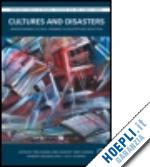Introduction The Editors 1 The Culture of (De-)Constructing Disasters. 1.1 Framing Disasters in the ‘Global Village?: Cultures of Rationality in Risk, Security, and News Kenneth Hewitt 1.2 Conversations in Catastrophe: Neoliberalism and the cultural construction of disaster risk Anthony Oliver-Smith 1.3 Design by Disasters: Seismic Architecture and Cultural Adaptation to Earthquakes Greg Bankoff 1.4 ‘Learning from History’? Chances, Problems and Limits of Learning from Historical Natural Disasters Gerrit Schenk 1.5 Disasters, Climate Change and the Significance of 'Culture' Terry Cannon 2 Cultural Linkages to Vulnerability. 2.1 Cultures and contra-cultures: Social divisions and behavioural origins of vulnerabilities to disaster risk James Lewis 2.2 The cultural sense of disasters. Practices and singularities in the context of HIV/AIDS Klaus Geiselhart, Fabian Schlatter, Benedikt Orlowski, and Fred Krüger 2.3 Religion and Belief Systems: Drivers of Vulnerability, Entry Points for Resilience Building? E. Lisa F. Schipper 2.4 The deep roots of nightmares Andrew Crabtree 3 Unequal Risks: Staging and Reducing Disaster Risk 3.1 Celebrity Culture, Entertainment Values ...and Disaster David Alexander 3.2 Disaster Management Culture in Bangladesh: The Enrolment of Local Knowledge by Decision Makers Brian Cook 3.3 Culture’s Role in Disaster Risk Reduction: Combining Knowledge Systems on Small Island Developing States (SIDS) Ilan Kelman, JC Gaillard, Jessica Mercer, Kate Crowley, Sarah Marsh, and Julie Morin 3.4 Culture, Gender and Disaster: From Vulnerability to Capacities JC Gaillard, Maureen Fordham, Kristinne Sanz 3.5 A Culture of Resilience and Preparedness – the Last Mile case study Tsunami Risk – Padang City, Indonesia Joern Birkmann Neysa Setiadi and Georg Fiedler 3.6 Participative Vulnerability and Resilience Assessment and the Example of the Tao People (Taiwan) Martin Voss and Leberecht Funk











